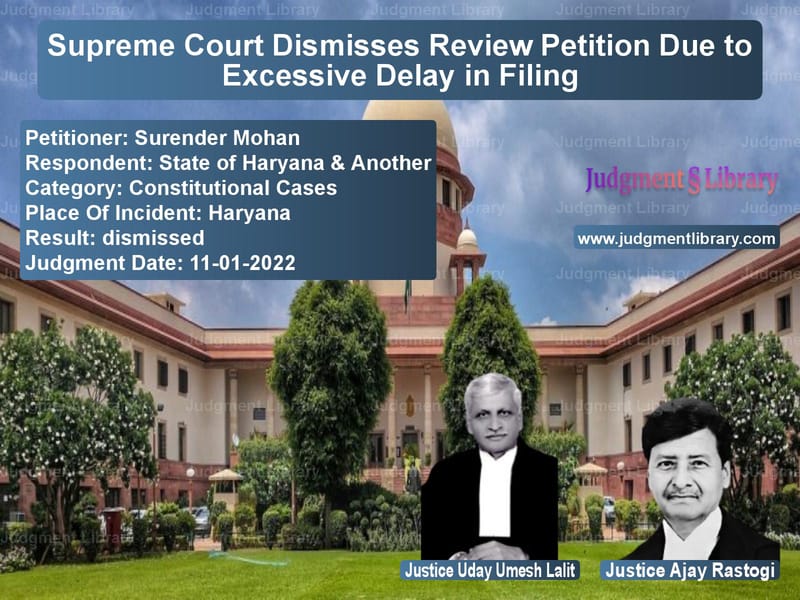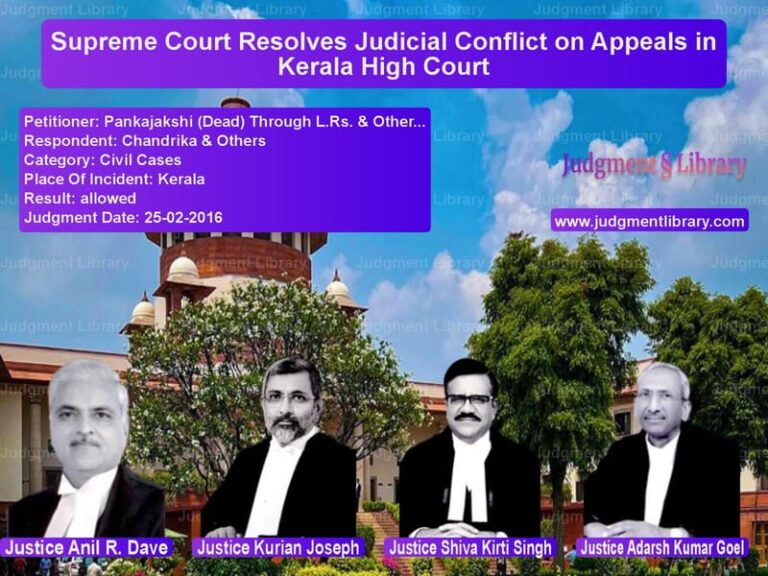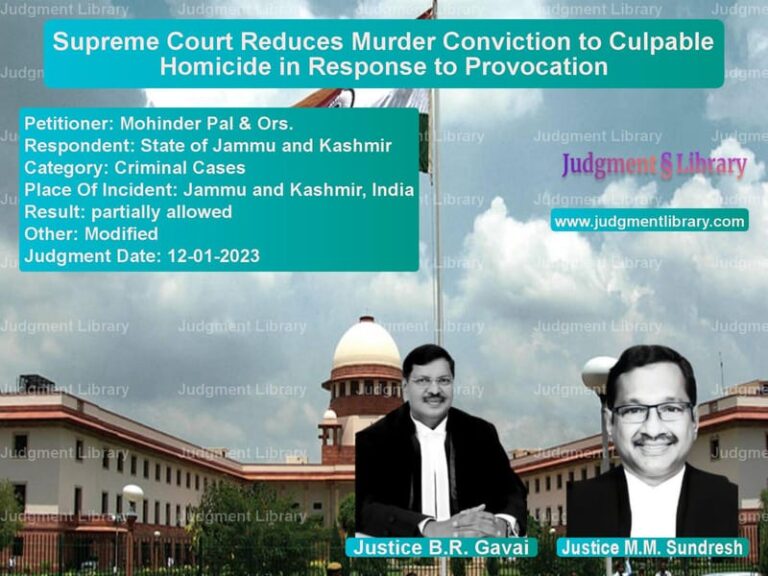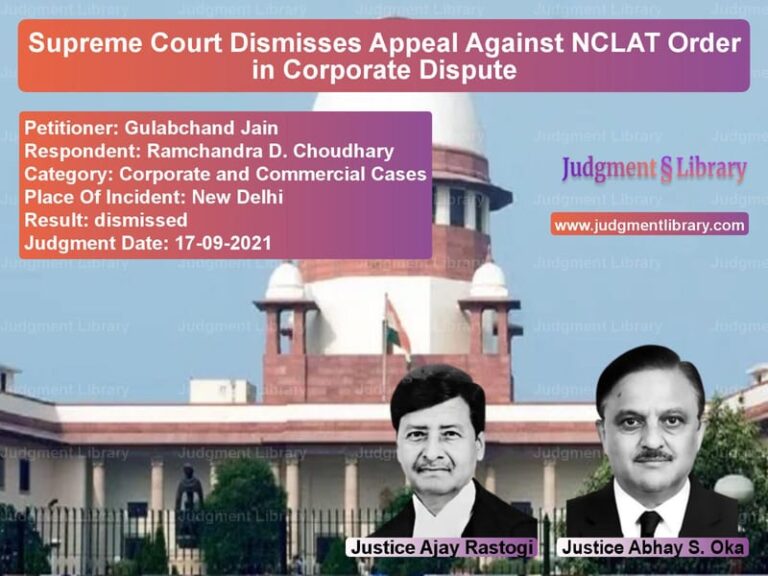Supreme Court Dismisses Review Petition Due to Excessive Delay in Filing
The case of Surender Mohan vs. State of Haryana & Another is a significant ruling by the Supreme Court on the issue of limitation in filing special leave petitions (SLPs). The Court dismissed the review petition due to an extraordinary delay of 2659 and 3017 days in filing the SLPs, citing a lack of a satisfactory explanation from the petitioner. This ruling reinforces the importance of adhering to procedural timelines in legal proceedings.
Background of the Case
The petitioner, Surender Mohan, filed a review petition challenging the Supreme Court’s earlier dismissal of his SLPs on the ground of limitation. The SLPs were filed with substantial delays of over seven and eight years, respectively. The petitioner sought a review of the dismissal, arguing that there were sufficient reasons for the delay.
However, the Supreme Court found no merit in the review petition, stating that the petitioner had failed to provide a compelling justification for the delay. The Court upheld its original order dismissing the SLPs due to limitation.
Legal Issues Raised
- Whether an extraordinary delay of over seven years in filing an SLP can be condoned.
- Whether the petitioner provided a satisfactory explanation for the delay.
- Whether the review petition demonstrated an ‘error apparent on the face of the record.’
Arguments of the Petitioner
The petitioner, through legal counsel, presented the following arguments:
- Exceptional Circumstances: The petitioner claimed that there were exceptional reasons for the delay, though specific details were not effectively substantiated.
- Justice Should Prevail Over Technicalities: The petitioner argued that procedural delays should not prevent the Court from delivering justice.
- Review Petition Standards: The petitioner contended that the Court should exercise its inherent jurisdiction to reconsider the dismissal.
Arguments of the Respondents
The respondents, including the State of Haryana, countered the petitioner’s claims, arguing:
- Unexplained Delay: The petitioner had failed to provide a reasonable or justified explanation for the prolonged delay.
- Procedural Discipline: Accepting such delayed petitions would set a negative precedent, undermining procedural discipline.
- No Error Apparent on Record: The respondents asserted that the Supreme Court’s original dismissal order was legally sound and required no revision.
Supreme Court’s Observations
The Supreme Court, led by Justices Uday Umesh Lalit and Ajay Rastogi, made the following key observations:
- Strict Limitation Principles: The Court reaffirmed that an extraordinary delay of over seven years cannot be condoned without a compelling justification.
- No Satisfactory Explanation: The petitioner failed to provide valid reasons for the delay, making it impossible for the Court to overlook the limitation period.
- Limited Scope of Review Jurisdiction: The Court reiterated that review petitions must demonstrate an ‘error apparent on the face of the record’ to justify interference, which was absent in this case.
Final Judgment
The Supreme Court dismissed the review petition, stating:
“We have gone through the grounds raised in the instant review petition and do not find any error apparent on record to justify interference. This review petition is, therefore, dismissed.”
Implications of the Judgment
This ruling has several important implications:
- Strict Enforcement of Limitation Periods: The decision underscores the importance of adhering to procedural deadlines in legal matters.
- Limited Scope of Review Petitions: The ruling reaffirms that review petitions cannot be used as an alternative means to reargue a case.
- Accountability of Litigants: The judgment discourages unnecessary delays and ensures that litigants remain accountable for timely filing of appeals.
- Judicial Efficiency: The decision helps prevent judicial backlogs by ensuring that only cases with valid grounds for delay are entertained.
Conclusion
The Supreme Court’s decision in Surender Mohan vs. State of Haryana & Another reinforces the principle that legal proceedings must adhere to prescribed timelines. By dismissing the review petition due to excessive delay, the Court upheld the integrity of procedural rules while ensuring that only cases with valid reasons for delay are considered. This ruling serves as a reminder that litigants must act diligently and within the legal timeframe to avoid dismissal on the ground of limitation.
Read also: https://judgmentlibrary.com/supreme-court-remands-caste-certificate-case-for-fresh-review/
Petitioner Name: Surender Mohan.Respondent Name: State of Haryana & Another.Judgment By: Justice Uday Umesh Lalit, Justice Ajay Rastogi.Place Of Incident: Haryana.Judgment Date: 11-01-2022.
Don’t miss out on the full details! Download the complete judgment in PDF format below and gain valuable insights instantly!
Download Judgment: surender-mohan-vs-state-of-haryana-&-a-supreme-court-of-india-judgment-dated-11-01-2022.pdf
Directly Download Judgment: Directly download this Judgment
See all petitions in Fundamental Rights
See all petitions in Public Interest Litigation
See all petitions in Constitution Interpretation
See all petitions in Judgment by Uday Umesh Lalit
See all petitions in Judgment by Ajay Rastogi
See all petitions in dismissed
See all petitions in supreme court of India judgments January 2022
See all petitions in 2022 judgments
See all posts in Constitutional Cases Category
See all allowed petitions in Constitutional Cases Category
See all Dismissed petitions in Constitutional Cases Category
See all partially allowed petitions in Constitutional Cases Category







